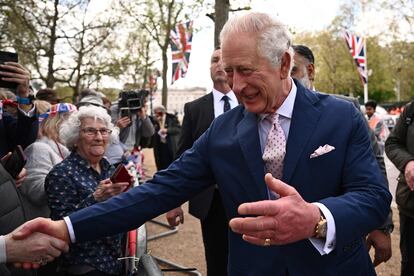Brexit bedlam leaves Charles III’s UK searching for the body and soul that go beneath the crown
Rishi Sunak is a more pragmatic leader than Boris Johnson and Liz Truss, but the country is yet to rebuild – and reconcile – following the 2016 referendum

This weekend, the United Kingdom celebrates the coronation of Charles III. When the festivities are over, the country will have to get back to the arduous task of seeking out the body and soul that go beneath the crown. The earthquake that is Brexit has left the U.K. in need of a major rebuild – and, as things stand, there seems to be no defined, halfway-shared vision for how to go about it. Not even a vague outline, in truth.
There’s no doubt that the country is in a better state today than just six months or so ago. Then, it was in the midst of the profound upheaval caused by the death of Queen Elizabeth II – a true unifying force for the nation – and the abrupt fall of Prime Minister Liz Truss, after less than two months in the job. What’s more, Truss’ blink-and-you-miss-it tenure had followed the eccentric, highly questionable leadership of Boris Johnson. Far from ruling the waves, Britain was completely at their mercy, adrift at sea and with no-one at the helm.
Today, the coronation offers up a symbol of institutional continuity and stability. And in Downing Street there is a prime minister, Rishi Sunak, who is showing greater competence and pragmatism than his predecessors. Sunak reversed Truss’ ludicrous economic measures, quelled the U.K.’s conflict with the EU over the status of Northern Ireland, and put the brakes on radical plans for a mass dumping of European regulations that are still in force in the country despite its departure from the bloc. The war in Ukraine helped to foster an awareness that this is not a time to mess about, and that it’s a good idea if European democracies work together. In Sunak, Brussels clearly sees a more serious, competent figure than his predecessors. That is likely to smooth the path towards solutions on a number of other outstanding issues. Gibraltar is one of them.
Chasms have been opened up between England and the U.K.’s other nations, between young and old, between urban and rural
But let’s not kid ourselves, either. Compared to the leadership of figures like Johnson, Truss, Nigel Farage and Jacob Rees-Mogg – it’s sometimes hard to believe that an advanced democracy really did hand them so much power and influence – Sunak is a step forward. But he’s nowhere near crafting a vision for the country’s future that genuinely has a chance of sticking. And, as this week’s local elections have shown, huge swathes of the electorate have no faith at all in the Conservative Party. Furthermore, while Sunak has shown pragmatism and a level of moderation in some areas, he adopts stances on migration that are practically far-right. And on social issues, he displays a deep, deep conservatism. The Labour Party, in the meantime, appears set on cultivating a position of calculated ambiguity, in a bid to avoid squandering a polling lead which, it is plain to see, is a product of the Tories’ calamities.
Meanwhile, it’s pretty clear that Charles III is not, and is unlikely to become, a match for Elizabeth II when it comes to bringing together a society with gaping wounds and profound divisions. The codename for the queen’s death was “London Bridge is down.” Judging by his past and his personality, it is doubtful that the new king will be able to bridge gaps like his mother did.
The U.K. is a country that finds itself in bad economic shape. It has the worst growth forecast in the G7; has a high rate of inflation that is worse than many comparable nations; and has experienced the greatest decline in workforce participation of any G7 member since the start of the pandemic, with 500,000 more people inactive on the job market.
But, above all, the U.K. has to rebuild on cracked, tainted foundations as it seeks to patch up its internal differences. That Brexit came about is largely thanks to a toxic political campaign brimming with insidiousness, lies and polarizing maneuvers that have left British society with deep scars. Chasms have been opened up between England and the U.K.’s other nations, between young and old, between urban and rural. Searching for common ground, for a new identity, is never easy – but this particular backdrop makes it an even taller order. What kind of society does the U.K. want to be? What place does it want to occupy in the world? The Brexiteers were very clear on how to blow everything to pieces; but, as we’ve seen, they had no idea how to put it all back together again.
It goes without saying that the U.K. is not alone in facing the complex task of finding its identity in such testing, changing times. Other countries are also enduring similar trials and tribulations. And how many of us, in our heart of hearts, fully know who we are or who we want to be? Have you thought long and hard about that recently? The answer won’t be found on the screens of our smartphones, computers, iPads or TVs. And, in the United Kingdom, the answer won’t be found in the coronation.
Sign up for our weekly newsletter to get more English-language news coverage from EL PAÍS USA Edition
Tu suscripción se está usando en otro dispositivo
¿Quieres añadir otro usuario a tu suscripción?
Si continúas leyendo en este dispositivo, no se podrá leer en el otro.
FlechaTu suscripción se está usando en otro dispositivo y solo puedes acceder a EL PAÍS desde un dispositivo a la vez.
Si quieres compartir tu cuenta, cambia tu suscripción a la modalidad Premium, así podrás añadir otro usuario. Cada uno accederá con su propia cuenta de email, lo que os permitirá personalizar vuestra experiencia en EL PAÍS.
¿Tienes una suscripción de empresa? Accede aquí para contratar más cuentas.
En el caso de no saber quién está usando tu cuenta, te recomendamos cambiar tu contraseña aquí.
Si decides continuar compartiendo tu cuenta, este mensaje se mostrará en tu dispositivo y en el de la otra persona que está usando tu cuenta de forma indefinida, afectando a tu experiencia de lectura. Puedes consultar aquí los términos y condiciones de la suscripción digital.









































